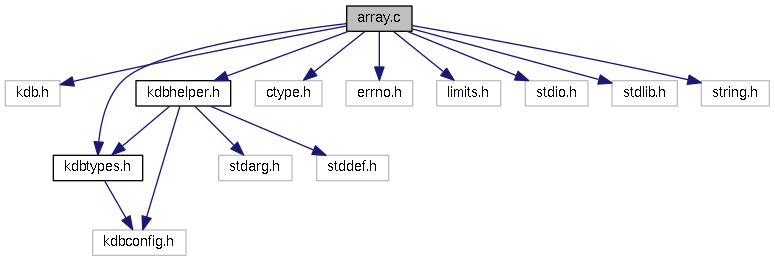Array methods. More...
#include <kdb.h>#include <kdbease.h>#include <kdbhelper.h>#include <kdbtypes.h>#include <ctype.h>#include <errno.h>#include <limits.h>#include <stdio.h>#include <stdlib.h>#include <string.h>
Functions | |
| int | elektraArrayIncName (Key *key) |
| Increment the name of the key by one. More... | |
| KeySet * | elektraArrayGet (const Key *arrayParent, KeySet *keys) |
| Return all the array keys below the given arrayparent The arrayparent itself is not returned. More... | |
| Key * | elektraArrayGetNextKey (KeySet *arrayKeys) |
| Return the next key in the given array. More... | |
Detailed Description
Array methods.
- Copyright
- BSD License (see doc/COPYING or http://www.libelektra.org)
Function Documentation
| KeySet* elektraArrayGet | ( | const Key * | arrayParent, |
| KeySet * | keys | ||
| ) |
Return all the array keys below the given arrayparent The arrayparent itself is not returned.
For example, if user/config/# is an array, user/config is the array parent. Only the direct array keys will be returned. This means that for example user/config/#1/key will not be included, but only user/config/#1.
A new keyset will be allocated for the resulting keys. This means that the caller must ksDel the resulting keyset.
- Parameters
-
arrayParent the parent of the array to be returned keys the keyset containing the array keys.
- Returns
- a keyset containing the arraykeys (if any)
- Return values
-
NULL on NULL pointers
| Key* elektraArrayGetNextKey | ( | KeySet * | arrayKeys | ) |
Return the next key in the given array.
The function will automatically allocate memory for a new key and name it accordingly.
- Precondition
- The supplied keyset must contain only valid array keys.
The caller has to keyDel the resulting key.
- Parameters
-
arrayKeys the array where the new key will belong to
- Returns
- the new array key on success
- Return values
-
NULL if the passed array is empty NULL on NULL pointers or if an error occurs
| int elektraArrayIncName | ( | Key * | key | ) |
Increment the name of the key by one.
Alphabetical order will remain
e.g. user/abc/#9 will be changed to user/abc/#_10
For the start: user/abc/# will be changed to user/abc/#0
- Parameters
-
key which base name will be incremented
- Return values
-
-1 on error (e.g. too large array, not validated array) 0 on success
 1.8.8
1.8.8